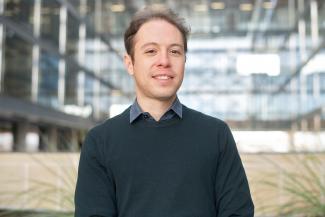
Brian Johnson, assistant professor in the Chandra Family Department of Electrical and Computer Engineering at The University of Texas at Austin, has been awarded a Transactions on Power Electronics (TPEL) Prize Paper Award for work on "Benchmarking Nonlinear Oscillators for Grid-Forming Inverter Control," along with co-authors Minghui Lu and Sairaj Dhople.
Each year, the Editor and Associate Editors of the IEEE Transactions on Power Electronics (TPEL) recognize four first prize papers and six second prize papers deemed best among those published in the Transactions during the preceding calendar year.
Abstract:
Virtual oscillator control (VOC) is a time-domain strategy that leverages the dynamics of nonlinear oscillator circuits for synchronizing and regulating grid-forming inverters. In this article, we examine a class of second-order circuits composed of a harmonic oscillator and nonlinear state-dependent damping that has found extensive interest in the context of VOC. We center our analysis on the Van der Pol, Dead-zone, and Andronov-Hopf oscillators; these are characterized by several distinguishing attributes but they all share the common structure noted above. Analytical methods based on averaging and perturbation theory are outlined to derive several performance metrics related to harmonic and dynamic properties of these oscillators under a unified framework. Our results reveal that the Andronov-Hopf oscillator is well suited for grid-forming inverter applications since it can yield harmonics-free waveforms without compromising dynamic performance. Analytical results are validated with numerical simulations and experiments, and a multiinverter hardware setup is used to illustrate a practical use case.
Bio:
Brian Johnson is an Assistant Professor and a Fellow of the Jack Kilby/Texas Instruments Endowed Faculty Fellowship in Computer Engineering in the Department of Electrical and Computer Engineering at The University of Texas at Austin.
He obtained his M.S. and Ph.D. degrees in Electrical and Computer Engineering from the University of Illinois at Urbana-Champaign, Urbana, in 2010 and 2013, respectively. Previously, he was the Washington Research Foundation Innovation Assistant Professor within the Department of Electrical and Computer Engineering at the University of Washington in Seattle. Prior to joining the University of Washington in 2018, he was an engineer with the National Renewable Energy Laboratory. His research interests are in renewable energy systems, power electronics, and control systems.
His work was recognized with a National Science Foundation (NSF) CAREER Award in 2022. He is currently co-leading the multi-institutional Universal Interoperability for Grid-Forming Inverters (UNIFI) Consortium which is funded by the U.S. Department of Energy (DOE). UNIFI brings together leading researchers, industry stakeholders, utilities, and system operators to advance grid-forming inverter technologies. UNIFI will focus on developing the technologies and best practices for the seamless integration of renewable-based power electronics into electric grids.
Funding:
This work was funded by the DOE Solar Energy Technologies Office.
